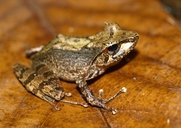|
Description
M 35-36 mm. Weakly expressed dorsolateral ridges, small supraocular tubercles, no heel spine. Distinct interocular tubercles. Males with greyish bilobate subgular vocal sacs. Morphology and colouration very similar to G. cornutus (which has a single subgular vocal sac in males). As in this species, and in G. redimitus and G. tandroka, sometimes specimens with broad yellow dorsolateral bands occur (Glaw and Vences 2007). Distribution and Habitat
Country distribution from AmphibiaWeb's database: Madagascar
Ambatolahy, Midongy, Ranomafana (Glaw and Vences 2007). Found at elevations between 600 to 1200 m asl (Cadle and Glaw 2008). This species is usually observed near streams and tiny trickles of water in pristine rainforest, where it climbs on low vegetation (Cadle and Glaw 2008). Life History, Abundance, Activity, and Special Behaviors
Habits: Males call at night from the vegetation in or close to rainforest, 1-2 m above the ground, sometimes not in vicinity of open water (Glaw and Vences 2007).
Calls: A very slow series of unharmonious notes (Glaw and Vences 2007).
Trends and Threats
Listed as data deficient since it has only recently been described, and there is still very little information on its extent of occurrence, status, and ecological requirements. Occurs in a protected area, the Parc National de Ranomafana. Requires pristine rainforest and is not found in disturbed areas. Habitat is receding due to agriculture, logging, charcoal manufacture, invasion and spread of eucalyptus, grazing and expanding human settlement (Cadle and Glaw 2008). Possible reasons for amphibian decline General habitat alteration and loss
Habitat modification from deforestation, or logging related activities
Intensified agriculture or grazing
Urbanization
Subtle changes to necessary specialized habitat
Comments
Taken with permission from Glaw and Vences (2007).
References
Cadle, J. and Glaw, F. (2008). Gephyromantis tschenki. In: IUCN 2008. 2008 IUCN Red List of Threatened Species. www.iucnredlist.org. Downloaded on 20 March 2009.
Glaw, F., and Vences, M. (2007). Field Guide to the Amphibians and Reptiles of Madagascar. Third Edition. Vences and Glaw Verlag, Köln.
Originally submitted by: Miguel Vences and Frank Glaw (first posted 2009-03-20)
Edited by: Catherine Aguilar (2009-04-07)Species Account Citation: AmphibiaWeb 2009 Gephyromantis tschenki <https://amphibiaweb.org/species/6174> University of California, Berkeley, CA, USA. Accessed May 17, 2025.
Feedback or comments about this page.
Citation: AmphibiaWeb. 2025. <https://amphibiaweb.org> University of California, Berkeley, CA, USA. Accessed 17 May 2025.
AmphibiaWeb's policy on data use.
|
